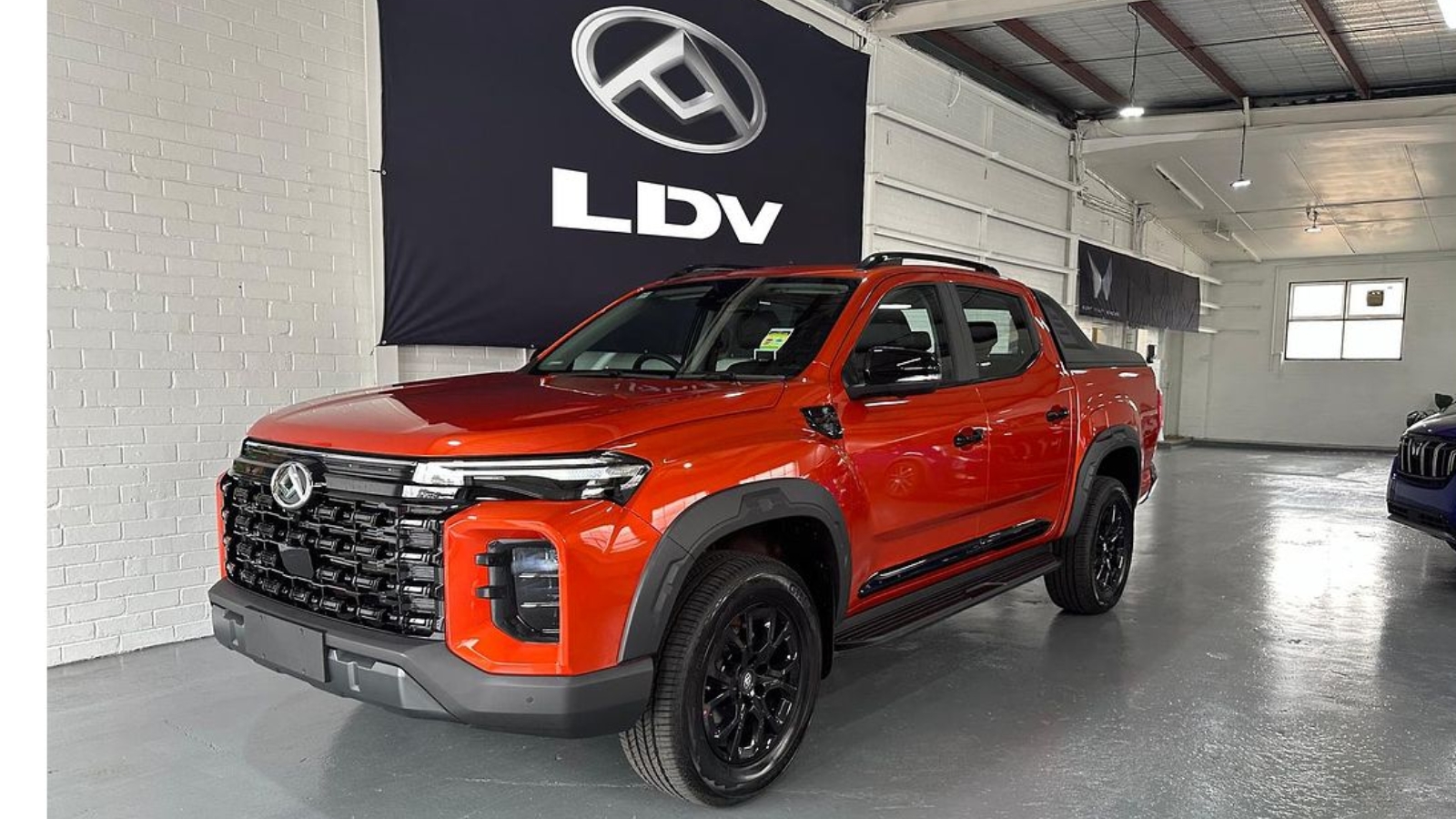If you’ve been waiting for the next generation of electric utes to hit Australian roads, your patience might soon be rewarded. The upcoming LDV eTerron 9 has been caught testing in Sydney, giving us our first real-world glimpse of what could be Australia’s most capable electric ute yet.
What We Know About the e Terron 9
The eTerron 9 represents a significant step forward from LDV’s pioneering eT60, which was Australia’s first electric ute. Recently spotted in Sydney’s Royal National Park, this boxy electric workhorse is getting its final touches before the official Australian launch.
A Major Upgrade from the eT60
While the original eT60 broke new ground, it had limitations that many tradies and outdoor enthusiasts found restrictive. The new eTerron 9 addresses most of these concerns head-on.
The most notable improvement is the towing capacity. Where the eT60 could only manage 1000kg, the eTerron 9 will haul up to 3500kg – matching many diesel utes and making it genuinely useful for boat owners, caravan enthusiasts, and anyone who needs serious pulling power

Performance That Actually Matters
Two Power Options
LDV isn’t messing around with the eTerron 9’s performance credentials. You’ll be able to choose between two configurations:
- Single-motor rear-wheel drive: 200kW of power
- Dual-motor four-wheel drive: 325kW of power
To put that in perspective, the current eT60 only produces 130kW. The dual-motor version will have more power than most V8 utes currently on the market.
Range and Charging
The eTerron 9 packs a substantial 102kWh lithium iron phosphate (LFP) battery. LDV claims this will deliver up to 430km of range in the dual-motor variant based on WLTP testing. While real-world range will likely be lower, especially when towing, this represents a solid improvement over the eT60’s more limited range.
Key Specifications
| Specification | Details |
|---|---|
| Battery Capacity | 102kWh LFP |
| Range (WLTP) | Up to 430km |
| Power Options | 200kW (RWD) / 325kW (AWD) |
| Towing Capacity | 3500kg braked |
| Length | 5500mm |
| Width | 1997mm |
| Height | 1860mm |
| Wheelbase | 3300mm |
| Ground Clearance | 220mm |
| GVM | 3320kg – 3500kg |
Practical Features for Real-World Use
Vehicle-to-Load Technology
One of the most exciting features is the vehicle-to-load (V2L) capability. This means you can use the eTerron 9 as a massive power bank. The ute will feature multiple 2.2kW sockets throughout the vehicle, plus an external 6.6kW connection.
For tradies, this could replace generators on job sites. For camping enthusiasts, it opens up possibilities for powering everything from coffee machines to portable fridges without worrying about battery drain.
Size and Capability
The eTerron 9 is genuinely substantial. At 5500mm long and nearly 2000mm wide, it’s significantly larger than the current T60. The 220mm of ground clearance and four-wheel drive capability (in the dual-motor version) suggest it won’t shy away from challenging terrain.
When Can You Get One?
Launch Timeline
LDV Australia has confirmed both the electric eTerron 9 and its diesel sibling, the Terron 9, are on track for a mid-2025 Australian launch. Originally scheduled for early 2025, the timeline has been pushed back slightly, but testing is progressing well.
The spotted vehicle appears to be undergoing final validation testing, particularly for advanced driver assistance systems, multimedia functions, and battery charging systems.
Pricing Expectations
While LDV hasn’t announced pricing yet, expect the eTerron 9 to cost more than the current eT60. Given the significant improvements in capability, range, and features, this premium seems justified. The current T60 range sits between $45,253 and $53,674 drive-away, so the eTerron 9 will likely start north of $60,000.
Competition Heating Up
The Electric Ute Battle
The eTerron 9 will enter an increasingly crowded market. By the time it launches, Australia will have several plug-in hybrid utes available, including the BYD Shark 6, GWM Cannon Alpha, and Ford Ranger PHEV.
Pure electric competition will come from vehicles like the Isuzu D-Max EV, potential Kia Tasman EV, and various Chinese brands entering the Australian market.
Why the eTerron 9 Matters
Despite the growing competition, the eTerron 9 has several advantages. LDV has real-world experience with electric utes through the eT60. They understand what Australian customers need and where the first generation fell short.
The combination of serious towing capacity, genuine four-wheel drive capability, and practical features like V2L technology positions the eTerron 9 as a legitimate work vehicle rather than just an environmental statement.
What This Means for Buyers
If you’re considering an electric ute, the eTerron 9 shapes up as a compelling option. The improved range, towing capacity, and power output address the main criticisms of early electric utes.
For businesses considering fleet electrification, the V2L capability could provide additional value beyond just transportation. The ability to power tools and equipment directly from the vehicle could simplify operations and reduce equipment needs.
The mid-2025 launch timing also means you’ll have time to see how other electric and hybrid utes perform in the Australian market before making a decision.
Frequently Asked Questions
Q: When will the LDV eTerron 9 be available in Australia?
A: LDV has confirmed a mid-2025 launch timeline for both the electric eTerron 9 and diesel Terron 9 models.
Q: How much will the eTerron 9 cost?
A: Pricing hasn’t been announced yet, but expect it to cost more than the current eT60, likely starting above $60,000.
Q: Can the eTerron 9 really tow 3500kg?
A: Yes, LDV has confirmed the eTerron 9 will offer the same 3500kg braked towing capacity as its diesel sibling, a significant improvement over the eT60’s 1000kg limit.
2026 Kia EV9 GT Revealed as High-Speed Family SUV for Australia
